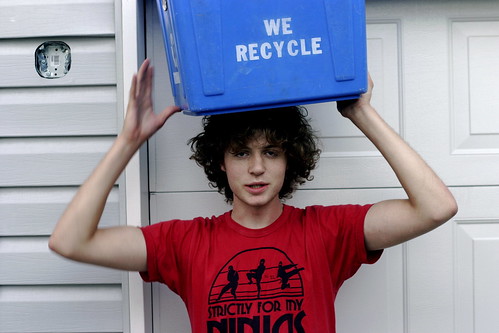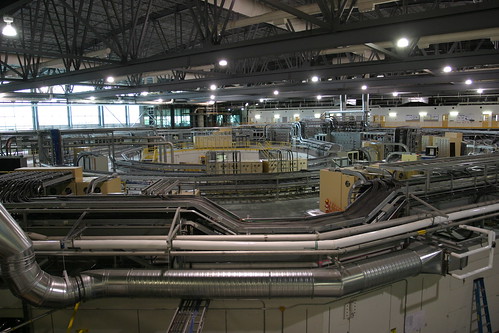
Currently listening to: Plants And Animals!
Slightly non-chemistry related (or is it?): it is well worth your time to watch The Story of Stuff, a 20 minute film on how humans are going to hell in a cheap, $4.99 made-in-China hand basket.[1] Go watch it, now! now now now!
One of the main motivations that led me to be a materials grad student is the idea that I might make something that would actually be useful for actual, um, stuff. And given my utter lack of background in total synthesis and thus extremely low probability of synthesizing anything pharmacological, a big candidate for whatever I might make is consumer products. Cellphones, televisions, cars. Things that people buy. And then promptly throw away, because the next generation of graduate students has already devised a new something that is at least three times cooler than my little widget (or at least some marketing student has come up with a better advertising campaign). Over 99% of consumer goods wind up in the landfill within six months!
Which happens to be an awesome thing if you're in the business of selling new widgets, but a rather shitty thing if you're in the business of being a planet. That amount of consumption, as the movie points out, isn't founded in anything beyond the sheer cultural manipulation of our values by profit-driven advertising. Advertising dollars that can in turn and in part fund R&D efforts that pay salaries of students, although sadly usually not enough to purchase said little widgets most of the time.
The reasons behind why researchers do what they do are a lot more complex than this, definitely. But I think it's important for us chemists to think long and hard about where our molecules might wind up, and to talk about it. You might not be making chlorine gas or TNT, but you may be making OLED technology so cheaply available that it makes more sense to throw out your television like you would throw out a newspaper. [2]
How often do you think about the big picture of your research?
[1] Between an epic hard drive failure and a rather untimely/completely timely vacation, I still think I'm doing... alright... for my blogging debut. Look what happened to Retread: extended hiatus= cool gig blogging for Nature! by this logic, I am looking forward to my invitation as editor of Science. ...guys?
[2] okay, I admit that's a bit of a straw man. OLEDS are some badass chemistry at work, and would make a gigantic difference in terms of energy consumption if they could make their way into lighting sources, for example. but what's going to happen to them when consumers just chuck them in the garbage?
Friday, May 2, 2008
stuff
Subscribe to:
Post Comments (Atom)

3 comments:
Consider the alternatives...the inorganic stuff in displays isn't exactly friendly either. Gallium? Arsenic? Mmm, tasty...I SO want those in my groundwater. If you use carbon-based semiconductors, you're worried about...what, the ITO in the display glass? What if we could use zinc oxide instead?
I agree- OLEDs would be a huge step in the right direction over things like GaAs, in terms of the toxicity.
I guess I'm just wondering what really drives research into things like OLEDS. Ridiculously cheap displays are going to be an awesome thing (I for one can't wait to watch television on my underpants).
But, I can't help but think that one of the main driving forces behind their development is a bunch of executives licking their lips over the idea of more disposable technology.
People already treat their iPods and cellphones as things to be replaced with the next latest and greatest thing. If materials chemistry is being driven in large part by the push to create these marketable technologies, then do we as materials chemists hold any responsibility?
"but a rather shitty thing if you're in the business of being a planet."
Haha, well said.
Post a Comment